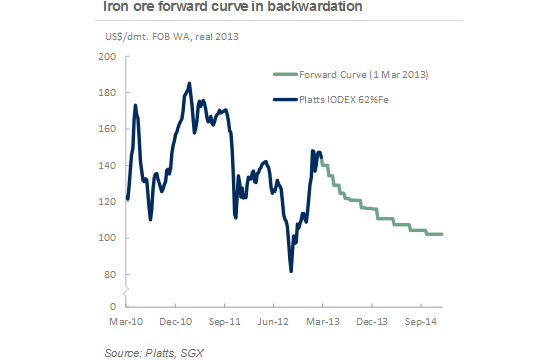Product
March 6, 2013
Iron Ore Prices Dropping in China
Written by Sandy Williams
Written by: Sandy Williams
Iron ore had its biggest slide in seven weeks dropping 2.4 percent on Tuesday to $145.20 per dry metric ton (Fe 62) at the Chinese port of Tianjin (source: The Steel Index).
Ore shipments out of Australia have been slowed by a series of seasonal hurricanes forcing sporadic port closures. Although shipments are increasing following the latest hurricane, Chinese iron ore importers are drawing from port stockpiles rather than placing new orders according to swaps brokers. SteelHome reported stockpiles at 36 Chinese ports dropped by 100,000 tons to 79.3 million tons between February 22 and March 1. Based on current steel production levels in China, iron ore inventory at the Chinese ports can meet the demand for 25.83 days of production.
Swaps fell 4.8 percent yesterday according to data from SGX AsiaClear. Reuter’s analyst Clyde Russell, said, based on historical data; the recent backward pricing trend of swap contracts indicates that iron ore prices may fall as much as 40 percent in the next six months. An iron ore swap contract is a cash-settled derivative between a seller and a buyer of iron ore at a fixed price for a set time that provides price certainty for both parties (source: Reuters)
Rio Tinto, in its March 4 presentation to investors, predicted iron ore will fall to around $100/dry metric ton by September 2014.

The iron ore forecast for 2013 is an average of $125-$130/metric ton. Chinese iron ore imports are expected to rise about 5 percent to 778 million tonnes in 2013 but production and shipment of ore out of Australia is also expected to increase. The supply is expected to outpace demand and keep iron ore prices from rising. Several factors, however, could impact ore prices in the coming months. China ore output could increase, India may enter the import market due to mining bans at home, and new supply capacity may find a market. The three big ore companies, Vale, Rio Tinto and BHP Billiton, could also decide to limit output to control prices. (Sources: Reuters & Bloomberg)







